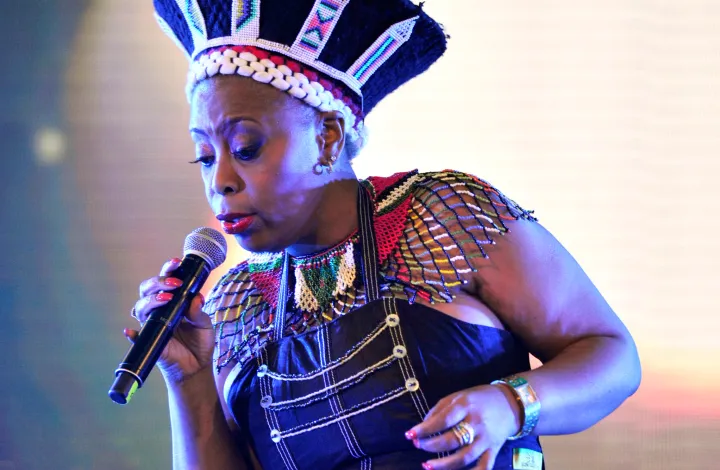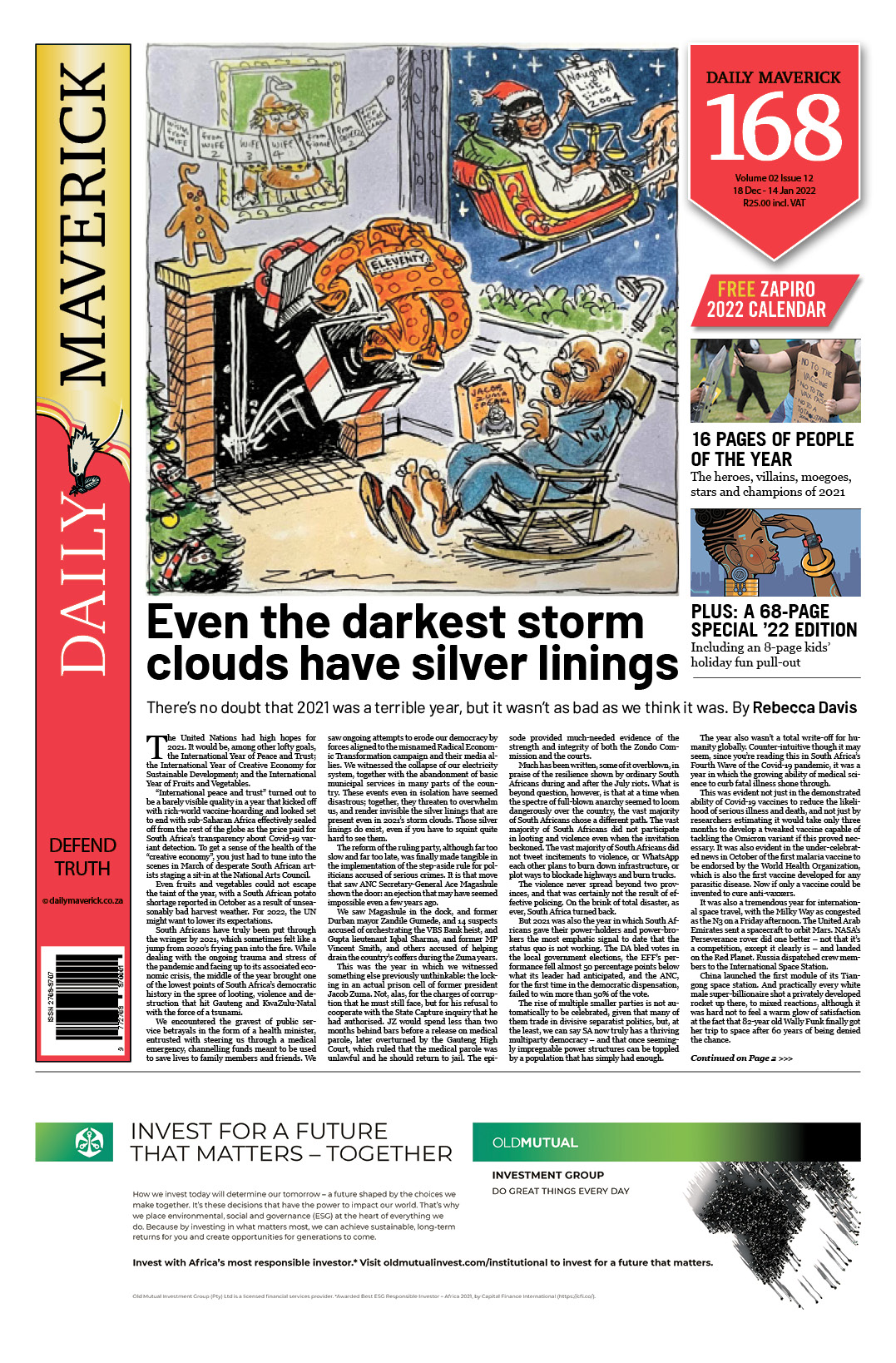ARTIST OF THE YEAR
Winner: Songbird Sibongile Mngoma; Runners-ups: Adele & Britney Spears

Sibongile Mngoma used her voice to mobilise the arts and culture community, and led a protest to peacefully occupy the offices of the National Arts Council, demanding an accurate audit of its grant programme and public disclosure of the names of those being helped. In a way uncommon for today’s South Africa, she has also publicly criticised Minister of Sport, Arts and Culture Nathi Mthethwa in the media, insisting that his office respond fully to the growing criticisms of his department’s grant programme.
For South Africa, like so much of the rest of the world, 2021 has featured Covid lockdowns, stringent audience restrictions and permanent venue closures, which together have had a catastrophic impact on the country’s arts and cultural community.
For much of the year, the nation’s live music performance venues, clubs and theatres have been virtually empty, and renowned ones like Cape Town’s Fugard Theatre are now closed for good. While some venues have recently reopened under severe audience size restrictions and spacing requirements for seating, the cumulative impact has made it very hard for venues and independent producers alike to host events that come close to covering costs.
Circumstances have been still worse for individual performers and crews. Most are independent freelancers contracted for individual events.
Many have lost virtually a year’s bookings owing to those closings, even though some venues have eventually begun operations in these restrictive conditions. Without work, unless they have figured out how to turn online programmes into actual revenue streams, if the situation for venue operators has been difficult, the impact on the lives of performers and backstage personnel has been nearly catastrophic since 2020.
Left without incomes, some artists have had to sell cars or household goods, have failed to pay mandatory school fees for children, forgone medical and dental needs, cancelled insurance and pension fund payments, and ultimately moved in with friends or back to their families if there was even space. This disaster has had wider implications for the national economy as well, given that the country’s arts and culture sector represents more than 7% of the national economic life in more normal times.
Some private institutions have provided small amounts of aid and a few foreign foundations and embassies have also made funds available. However, the South African government’s own lackadaisical response to this crisis, then its malpractice or malfeasance in managing its small grants programme for people in the arts and culture sector, has made circumstances still harder for many.
Despite years of training and professional practice for many, performers and others in the industry have tried to subsist on the meagre special monthly grant that has been offered to the truly destitute. Moreover, the shambolic administration by the National Arts Council (an independent body under the umbrella of the Department of Sport, Arts and Culture) of its own small grants programme, with much confusion about who has qualified, how much might be made available to individuals and groups, and an onerous application procedure, has delivered little help to most applicants.
The growing frustrations and anger over these shambles finally provoked singer Sibongile Mngoma into taking the leadership of increasingly focused public protest and direct action, rather than simply bemoaning the fate of the artistic sector at the hands of an uncaring government.
Mobilising supporters, she led a peaceful occupation of the offices of the National Arts Council, demanding an accurate audit of its grant programme and public disclosure of the names of those being helped, as well as the amounts given. In a way uncommon for today’s South Africa, she has also publicly criticised Minister of Sport, Arts and Culture Nathi Mthethwa in the media, insisting that his office respond fully to the growing criticisms of his department’s grant programme.
This year, too, Mngoma has helped to bring to life a new social media group, Im4theArts, which has become a potent forum for the usually fissiparous artistic and cultural community across a wide spread of genres.
When the minister abruptly cancelled a scheduled meeting only an hour before it was to begin, Mngoma even faced down police officers sent to prevent her from protesting over that sudden cancellation. The police left her standing in the middle of the road with her clothing ripped from her body by their attempts to remove her from the street.
As The Sowetan described the incident, “Music artist Sibongile Mngoma stripped half-naked after a meeting scheduled to take place between artists and a government minister was cancelled abruptly. Artists were dragged to clear the way for vehicles at the entrance of the minister of [sport], arts and culture Nathi Mthethwa’s Pretoria offices…”
The Sowetan quoted Mngoma, who had said: “After we had a good meeting with the department last week, they agreed to meet us today. They decided to postpone the meeting at the 11th hour. I received a text when I was on my way here from Bloemfontein. I refused to allow that to happen. The cancellation was at the last minute. Now they are harassing us for having this peaceful picket. They have dragged me on the floor…” Part of their effort to meet the minister was to follow up the arts community’s persistent demand for the public release of the forensic report on the mismanagement of Presidential Employment Stimulus programme funds and to clear up the mess.
Mngoma’s efforts have clearly stung the government. Although the Department of Sport, Arts and Culture’s panjandrums have yet to meet with her for that promised comprehensive discussion of the issues faced by this sector, her efforts have kept the pressure on. In this, she has carved out space for individual artists and performers to insist on the government’s responsibility for its own accountability, in the midst of thousands of individual financial disasters.
In her own musical career, Mngoma studied music at the University of Cape Town and at the Accademia Musicale Chigiana in Italy, and as a professional singer, over the years she has appeared in many live concerts, operas and recitals throughout the country, and even appeared on stage with the late Luciano Pavarotti. The winner of numerous awards, she has been described by critics as a “natural diva”. Aside from lighter works, her many operatic roles have included Clara in Gershwin’s Porgy and Bess, Mimi in Puccini’s La Bohème, Zerlina and Donna Elvira in Mozart’s Don Giovanni, Dido in Purcell’s Dido and Aeneas, and Nandi in Khumalo’s Princess Magogo.
But rather than just coping with the difficulties the pandemic has caused in her own career, Mngoma – granddaughter of renowned teacher, activist and arts advocate the late Khabi Mngoma, and niece of the internationally renowned singer, the similarly late Sibongile Khumalo – chose this year to devote her energies to pursue the government’s failures in dealing with the difficulties many of her cultural and artistic counterparts have endured. In a way that would have been unimaginable in previous years, Mngoma’s efforts have mobilised the arts and culture community against governmental actions (and inaction) in a way unseen since the heyday of anti-apartheid protests of the 1980s. This has been to insist the government follow through with its promises when so many in the creative community can barely cover basic necessities. DM168
FIRST RUNNER-UP: ADELE
What has not already been said about British pop phenomenon Adele?
Since the release of her monumental second studio album, 21, ten years ago, every move made by the London-born singer since has felt like a cultural event. Such has been the case for her 2021 effort, 30.
Across 12 deeply personal tracks, the album details the singer’s divorce from Simon Konecki in 2019. While Adele is no stranger to emotional transparency in her music, 30 truly leaves no emotional stone unturned. Whether it is explaining the separation to their nine year-old son, Angelo, on the gruelling My Little Love, or confessing the high-stakes intimacy that compelled her into the marriage in the first place, on the anthemic ballad To Be Loved, Adele came out swinging.
But it is the cultural ubiquity of Adele’s appeal that really earns her a spot on this list, and nowhere is that more apparent than in the South African context. From the flood of ‘yaadt’ and ‘gqom’ remixes of the album’s lead single, Easy On Me, which draw on the specific sounds of South African communities of colour, to the Instagram Live she hosted leading up to the release of the single, which launched a thousand memes, Adele’s hold on popular culture is unparalleled.
Spotify announced that Easy On Me garnered the most single-day streams in the music platform’s history upon its release, and Forbes reports that the song and album have topped music charts worldwide.
According to the music site Metacritic, critics have generally received the album just as warmly, with scores indicating “universal acclaim” for it.
With a prolific cult of personality and beloved music that could seemingly unite a nation, Adele’s re-emergence from a six-year musical hiatus has cemented her status as a global superstar. – Giuseppe Rajkumar Guerandi/DM168
SECOND RUNNER-UP: BRITNEY SPEARS
This year saw not one, but two popular documentaries about the well publicised battle for Britney Spears’s freedom from a conservatorship that essentially gave her father, Jamie, and her management full control over her person and estate for the past 13 years. Per the arrangement, decisions around her career, spending and even movements were vested in her conservators.
Framing Britney Spears by The New York Times and Britney vs Spears from Netflix explored the conservatorship and subsequent legal conflict that spawned the #FreeBritney movement, a fan-driven campaign to release the pop star from the legal confines of the arrangement. On 12 November, the conservatorship was officially terminated in a California court.
While Spears did not specifically have a musical output this year, she lands a spot on this list for what her artistry represents in the context of her legal troubles. You would be hard-pressed to find an example of celebrity, unwavering fandom, and universal solidarity colliding in the type of ardent social impetus that led up to Spears’s release. In many ways, the #FreeBritney slogan became a kind of human rights cause behind which fans marched in streets and celebrities spoke out on.
The …Baby One More Time singer, who recently turned 40, became a definitive symbol for collectivising around the issues of human freedom, personal autonomy and mental health more generally. Her decades-long career and public persona have fostered a cultural capital that permeates across generational lines, and among women and the queer community more specifically, in an empowerment narrative rarely seen on such a scale. And in a free and liberal South Africa abstractly founded on similar values, who can’t identify with that? – Giuseppe Rajkumar Guerandi/DM168
***
DAILY MAVERICK PERSONS OF THE YEAR
Every year, Daily Maverick puts its mind to the question of who we should recognise in our annual Persons of the Year categories.
In the past, these decisions have been made after a bare-knuckle editorial brawl, but this year, we decided to do things a little differently. We had the bare-knuckle editorial brawl, but simply to arrive at a shortlist of nominees in each category. Using a new reader engagement tool called Hearken, we asked our online readers to cast their votes on who they think deserves the final nod. We also gave readers the option to choose their own candidate in any category in case they thought we had neglected anyone more worthy. The results were both expected and surprising.
On the whole, readers agreed with our shortlisted candidates, with a few exceptions. We had not considered Greta Thunberg as a candidate for International Person of the Year, but so many readers nominated her that she earned enough mentions to be a runner-up in that category.
Many objected to us only focusing on singers for our Artist of the Year and objected to the predominance of foreign singers in the category. Quite a few readers were critical of us leaving out African women and female contenders in general.
The journalists at Daily Maverick were mentioned several times as nominees for different categories of People of the Year – ah, thanks for the love, guys, but this time around we wanted to cast our net outside our inner circle.
The more than 800 readers who voted totally exceeded our expectations, because this was the first time we have opened People of the Year to readers’ votes.
Below are the categories. Read about the winners and runners-up in various categories below.
- South African Person of the Year – a person who has had the broadest or most significant impact on the country as a whole.
- Africa Person of the Year – a person who has made an outstanding contribution on the African continent this year.
- International Person of the Year – a person who has had broad international impact or made an outstanding contribution this year.
- South African Villain of the Year – there was no shortage of suggestions in this self-explanatory category…
- International Villain of the Year – as above, but drawn from foreign fields.
- South African Businessperson of the Year – not necessarily the person who made the biggest profit, but someone whose influence went beyond the balance sheets.
- Community Champion of the Year – someone uplifting, defending and representing ordinary South Africans, often against all odds.
- South African Polluter of the Year – individuals and entities which have succeeded in further dirtying our environment this year.
- Our Burning Planet Heroes of the Year – the green warriors fighting for our planet’s survival.
- South African Youth Champion of the Year – young people working to improve the lot of other young people.
- Sportsperson of the Year – a sportsperson whose positive impact has been felt either on or off the field.
- Sports Team of the Year – a team that has stood out from the rest in 2021 either on or off the field.
- Artist of the Year – a hitmaker whose musical or social influence has towered above others.
- Moegoe of the Year – someone whose behaviour perhaps falls short of Villain of the Year, but who has in some way acted idiotically.
- Grinch of the Year – someone who qualifies as a spoilsport or killjoy. – Rebecca Davis/DM168
This story first appeared in our weekly Daily Maverick 168 newspaper which is available for R25 at Pick n Pay, Exclusive Books and airport bookstores. For your nearest stockist, please click here.























 Become an Insider
Become an Insider
Comments - Please login in order to comment.